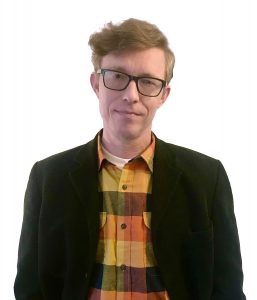Project Description
Home / Members / Postdoctoral Fellows / Matthew Parker

RESEARCH AREAS:
Philosophy of Physics
Philosophy of Probability
Philosophy of Mathematics
CONTACT:
MATTHEW PARKER
Research Associate;
New Directions in Philosophy of Cosmology Research Project
I grew up in San Diego, studied at UCLA and University of Chicago, and have taught at the LSE and University of Bristol.
I work mainly in the philosophy of mathematical sciences such as probability, set theory, computable analysis, and dynamical systems. My current project is about self-locating uncertainty and confirmation in an infinite multiverse, such as that implied by eternal inflation cosmology. What is the chance that you should be in a spatially flat world rather than a curved one? Does traditional probability theory apply, or is a new theory of chance required? And how does this bear on the confirmation of cosmological theories?
In other recent work, I have criticized new, iconoclastic theories of probability and cardinality on pragmatic grounds, while defending their legitimacy against anti-pluralist forms of realism. This has included historical studies of concepts of infinite number.
In my dissertation and related papers, I defined and motivated a new concept of decidability for problems in mathematical analysis and physics, and then proved that the known stable orbits of planetary systems and similar systems are undecidable in this important sense. I regard this as an example of conceptual engineering in the service of epistemology.
In general, my research is guided by an interest in engineering fruitful concepts and in underlying issues of realism and conceptual pluralism.
“Comparative Infinite Lottery Logic.” Studies in the History and Philosophy of Science Part A 48, 28–36 (2020). https://www.sciencedirect.com/science/article/pii/S0039368119301426
“Symmetry Arguments Against Regular Probability: A Reply to Recent Objections.” EJPS 9, 8.1–8.21 (2019). https://link.springer.com/article/10.1007/s13194-018-0229-1
“Gödel’s Argument for Cantorian Cardinality.” Noûs 53, 375–393 (2019). http://onlinelibrary.wiley.com/doi/10.1111/nous.12221
“Philosophical Method and Galileo’s Paradox of Infinity,” in Bart Van Kerkhove , ed., New Perspectives on Mathematical Practices. (World Scientific, 2009). http://philsci-archive.pitt.edu/4276/
“Computing the Uncomputable; or, The Discrete Charm of Second-order Simulacra.” Synthese 169, 447–463 (2009). https://doi.org/10.1007/s11229-008-9441-4
“Three Concepts of Decidability for General Subsets of Uncountable Spaces.” Theoretical Computer Science 351, 2–13 (2006). https://doi.org/10.1016/j.tcs.2005.09.052
“Undecidability in Rn: Riddled Basins, the KAM Tori, and the Stability of the Solar System.” Philosophy of Science 70: 2, 359–382 (2003). https://doi.org/10.1086/375472
Winner of the Philosophy of Science Association Graduate Student Essay Prize.
“Did Poincaré Really Discover Chaos?” Studies in the History and Philosophy of Modern Physics 29: 4, 575–588 (1998). https://doi.org/10.1016/S1355-2198(98)00018-5
Project Title: New Directions in Philosophy of Cosmology
Project Website: philcosmo.uwo.ca
Principal Investigators:
Chris Smeenk (Rotman Institute of Philosophy, Western University)
James Owen Weatherall (University of California, Irvine)
Brief Description:
Cosmology is different from other areas of the physical sciences, both in its subject matter – the universe as a whole – and in the tools we use to study it. Standard experimental and theoretical methods used throughout the rest of the physical sciences have little traction in cosmology, where we have only one universe to study and many of the features of greatest interest are removed from us in space and time. These methodological difficulties, coupled with the profound importance of understanding the history and structure of the universe, make cosmology an urgent subject for philosophical research.
